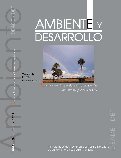Abstract
La apropiación de la acuicultura por parte de campesinos es un reto que los promotoresde su desarrollo necesitan comprender para enfrentar. Para ello es indispensableconocer la percepción de los campesinos con experiencia en esta área. Para llevar acabo una transferencia/apropiación del manejo de un sistema de acuicultura ruralintegral, se diseñó una estrategia de cuatro fases. El presente trabajo correspondea la primera fase, la cual consiste en una caracterización de la situación de los productoresacuícolas rurales de Yucatán. Se empleó el método de Evaluación RuralRápida. La muestra estuvo conformada por 21 granjas de las 118 que iniciaron enel 2002 con el cultivo tradicional de tilapia. En la perspectiva de los productores,se identificaron tres factores que favorecen su cultivo: satisfacción en el trabajo,“aprender haciendo” como estrategia de capacitación y sustentabilidad económicay organizativa en el proyecto, y tres que no lo favorecen: percepción de cambios enla política de los apoyos, dificultades en el desempeño de las actividades productivasderivadas de la conformación del grupo de trabajo y problemas con la transferenciadel paquete tecnológico.Ambiente y Desarrollo is registered under a Creative Commons Attribution 4.0 International Public License. Thus, this work may be reproduced, distributed, and publicly shared in digital format, as long as the names of the authors and Pontificia Universidad Javeriana are acknowledged. Others are allowed to quote, adapt, transform, auto-archive, republish, and create based on this material, for any purpose (even commercial ones), provided the authorship is duly acknowledged, a link to the original work is provided, and it is specified if changes have been made. Pontificia Universidad Javeriana does not hold the rights of published works and the authors are solely responsible for the contents of their works; they keep the moral, intellectual, privacy, and publicity rights.
Approving the intervention of the work (review, copy-editing, translation, layout) and the following outreach, are granted through an use license and not through an assignment of rights. This means the journal and Pontificia Universidad Javeriana cannot be held responsible for any ethical malpractice by the authors. As a consequence of the protection granted by the use license, the journal is not required to publish recantations or modify information already published, unless the errata stems from the editorial management process. Publishing contents in this journal does not generate royalties for contributors.


